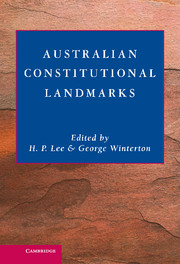Book contents
- Frontmatter
- Contents
- List of Cases
- List of Commonwealth Constitution Provisions
- List of Statutes
- List of Contributors
- Preface
- Introduction: The Commonwealth's Constitutional Century
- 1 The Emergence of the Commonwealth Constitution
- 2 The Engineers Case
- 3 The Uniform Income Tax Cases
- 4 The Bank Nationalisation Cases: The Defeat of Labor's Most Controversial Economic Initiative
- 5 The Communist Party Case
- 6 Fitzpatrick and Browne: Imprisonment by a House of Parliament
- 7 The Boilermakers Case
- 8 The Race Power: A Constitutional Chimera
- 9 The Double Dissolution Cases
- 10 1975: The Dismissal of the Whitlam Government
- 11 The Tasmanian Dam Case
- 12 The Murphy Affair in Retrospect
- 13 The Privy Council and the Constitution
- 14 Cole v Whitfield: ‘Absolutely Free’ Trade?
- 15 The ‘Labour Relations Power’ in the Constitution and Public Sector Employees
- 16 The Implied Freedom of Political Communication
- Index
3 - The Uniform Income Tax Cases
Published online by Cambridge University Press: 07 October 2011
- Frontmatter
- Contents
- List of Cases
- List of Commonwealth Constitution Provisions
- List of Statutes
- List of Contributors
- Preface
- Introduction: The Commonwealth's Constitutional Century
- 1 The Emergence of the Commonwealth Constitution
- 2 The Engineers Case
- 3 The Uniform Income Tax Cases
- 4 The Bank Nationalisation Cases: The Defeat of Labor's Most Controversial Economic Initiative
- 5 The Communist Party Case
- 6 Fitzpatrick and Browne: Imprisonment by a House of Parliament
- 7 The Boilermakers Case
- 8 The Race Power: A Constitutional Chimera
- 9 The Double Dissolution Cases
- 10 1975: The Dismissal of the Whitlam Government
- 11 The Tasmanian Dam Case
- 12 The Murphy Affair in Retrospect
- 13 The Privy Council and the Constitution
- 14 Cole v Whitfield: ‘Absolutely Free’ Trade?
- 15 The ‘Labour Relations Power’ in the Constitution and Public Sector Employees
- 16 The Implied Freedom of Political Communication
- Index
Summary
The Uniform Income Tax cases are landmarks in Australian political and constitutional history. The four interrelated Acts, which prompted the litigation by which the Commonwealth sought to secure sole authority for the imposition and collection of income tax, were described by critics as ‘revolutionary’ when first introduced into the Parliament. In response, the Government claimed that the measures were necessary to meet the ‘serious crisis’ presented by the current phase of World War II. On the existence of the crisis at least, there was no disagreement; the Bills received assent on the day after the battle of Midway Island. The rejection of the challenge in the first case and the limited success of the plaintiffs in the second affected the course of Australian federalism and engaged the High Court in some constitutional questions of the greatest difficulty, with implications well beyond the financial provisions of the Constitution.
With hindsight, the cases symbolise a turning point in Australian constitutionalism. In the first case, the national emergency, the perception of federalism as an interim form of government to which a unitary system was to be preferred and a literal approach to the judicial interpretation of the Constitution combined to produce an outcome that had scant regard to the federal nature of the Constitution. By 1957 the national emergency was over and much else had changed besides. Australia was on the way to political acceptance of federalism, however grudging.
- Type
- Chapter
- Information
- Australian Constitutional Landmarks , pp. 62 - 84Publisher: Cambridge University PressPrint publication year: 2003
- 4
- Cited by



